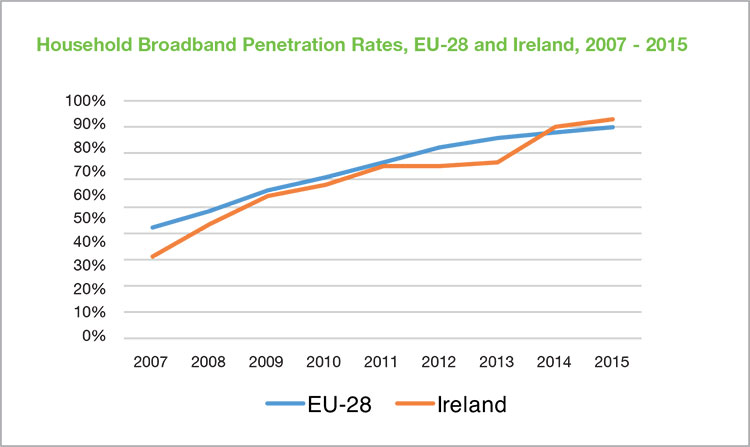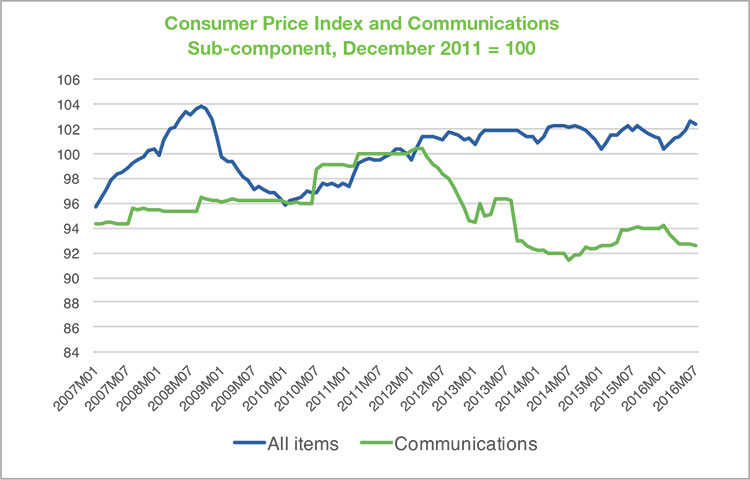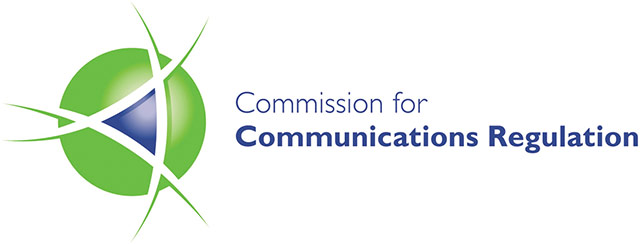Protecting consumers- enabling choice

 Commission for Communications Regulation (ComReg) Chairperson Jeremy Godfrey talks to eolas about the role of the regulator in protecting consumers and ensuring that Ireland has access to the latest online services available into the future.
Commission for Communications Regulation (ComReg) Chairperson Jeremy Godfrey talks to eolas about the role of the regulator in protecting consumers and ensuring that Ireland has access to the latest online services available into the future.
What is ComReg for? Jeremy Godfrey who is Chairperson of the Commission for Communications Regulation explains: “Looking at the telecommunications market for Ireland, everyone in Ireland needs to be able to get access to the benefits of modern communications wherever they are.” For most people Godfrey says that the market can deliver this aim, and it is ComReg’s role to ensure that the telecoms market operates effectively in the interests of the end users and of society generally. “Where the market cannot deliver that, because of differences in cost, requires government intervention, then we have a supporting role as the Department shapes its intervention,” he adds.
What ComReg does is driven by European and national legislation and falls into four main areas:
- Setting the rules for fair competition;
- To ensure that those rules are set in a way that incentivises investment;
- Protection and empowerment of consumers; and
- Management of the radio spectrum.
Looking back over the last five years Godfrey observes that “in a time of great financial crisis we still have seen billions of euro of investment put into the telecoms market and people in the more populated areas, that’s about 70 per cent of the population, over the past five years have gone from having very little high speed broadband to that now being widely available.” Looking at the figures in detail shows that 60 per cent of broadband speeds are above 30Mbps and two thirds above 10Mbps. Ireland does well when compared internationally in the proportion of people who have access to high speed broadband and in the average access speeds. However, it also performs badly in the proportion of people who have slow access.
“That’s a big challenge – to make sure the benefits that the 70 per cent of the population have are shared with that 30 per cent of the population. Another challenge is to ensure that the 70 per cent in Ireland stays up-to-date and has access to the services in the future. Regulation has a key role in ensuring that consumers get access to those services that will be developed into the future.”

Broadband
Broadband penetration has largely followed that of the EU-28 average as shown in the graph. “When you ask people why they do not have broadband they usually reply that they have no need for it. I think that will change because in the past broadband was only of use to those with a computer. In the future broadband will be the means by which entertainment and other smart home services will be delivered. Broadband will enable all sorts of things in the future and they will become part of how life is. The Internet of Things will drive a whole new set of uses and broadband will become more of a utility,” explains Godfrey.
Speeds are already increasing with over two thirds over 10Mbps and that trend will continue. ComReg made some decisions in 2013 which set the rules for investment in high speed broadband and in a way that encouraged eircom, now eir, to invest and also to encourage UPC, now Virgin Media, to invest to provide high speed broadband over its network and also to allow third parties such as Vodafone and Sky to provide services using the eir network. There is a major review of those decisions ongoing over the next year. “Those decisions have been successful in making that investment happen. This is what good regulation is about. If regulation had been too tight we would not have seen the investment and if it had been too lax we wouldn’t have seen the same choice with fewer players in the market. Getting the balance right is hugely important,” says Godfrey.
In discussing consumer choice, Godfrey believes that it has been enabled by those decisions and making the network available to other players is important and is indeed a key facet of the National Broadband Plan (NBP) – “which will be the biggest thing in broadband over the next few years.” ComReg has provided the technical and economic support for the Department of Communications, Climate Action and Environment’s broadband plan.
Wholesale market
The wholesale telecoms market objective is to improve consumer choice. Godfrey says that it is inevitable in telecoms that you will only ever have a limited number of competing networks and if you want to have richer consumer choice you need to have an effective wholesale market. That will be even more important in the future as innovation will be at the consumer level. “Companies will need to be able to use the network in whatever way they need to in order to deliver innovative services and not in the way the network operators what them to.”
In the immediate future, ComReg will be reviewing the wholesale broadband market – the products companies use to provide their competing broadband services. It will examine how competition has evolved and will also look at wholesale pricing. When the last pricing decision was made in 2013 there was a lot of uncertainty about the take up of broadband services. “That uncertainty is now largely behind us and any pricing decision should reflect that,” says Godfrey.
Another issue facing ComReg in the wholesale market is making sure the rules are complied with. The telecoms regulator has commissioned a review of eir’s regulatory governance to see if the institutional arrangements are fit for purpose and to ensure they are treating other operators the same as their own operations. This process has just started and will run for the next year.

Protecting the consumer
Godfrey sees protecting consumers as being at the core of what ComReg does. “The needs and expectations of consumers have been changing very rapidly, particularly in mobile. The mobile phone has gone from being a phone in your pocket to use when you are out to something that is now the primary internet access for most people. Mobile is also now the primary phone number people use and now want their mobile to work all around the house in a way they didn’t just a few years ago,” he says.
Godfrey, the former CIO of the Hong Kong Government, contends that “perhaps technology cannot meet all those expectations but sometimes the issue is what is being promised. We have a duty in our consumer protection role to make sure consumers are being properly informed about what they can expect. These are very complicated products to buy with lots of different pricing plans and products bundled together. It is important that consumers are properly informed and we have redesigned our website to help guide them to make the right decision. We also have a role to ensure what is promised is delivered.”
In this role ComReg found that some providers were not delivering on certain promises in their pricing plans and took several operators to court. It also took criminal proceedings for billing services that were either not delivered or even requested. Several companies were fined as a result of these actions. “Making sure we get good behaviour and consumers are treated fairly is an important role for ComReg,” he adds.
The EU adopted a new regulation earlier this year on consumer net neutrality. Net neutrality means that a service provider must treat all services equally. For example, a voice provider cannot choke access to Skype. An important part of the new regulation is that consumers must be informed not only of the theoretical maximum broadband speed but also the expected average speed during peak periods. As a result, there will be not only better information but contractual rights for consumers who will have rights to a committed level of service – at present they have no such rights.
Mobile
Over the last six months there has been a lot of media attention on the issue of mobile coverage, indoor coverage, coverage in rural areas and continuous coverage on roads. “There is clearly an issue to be addressed and some of the issues are not for ComReg. Indeed mobile companies themselves feel frustrated by their lack of ability to fully deploy their networks, often due to planning objections. The Government’s new mobile taskforce, which ComReg attends as an observer, has been set up to address the issue.”
ComReg also manages the radio spectrum in Ireland. It is currently running a process to assign radio spectrum in the 3.6GHz band. One use for this is rural high speed broadband. That will provide increased coverage and more competition in new areas. It is also potentially a 5G band. Once the auction is complete ComReg will turn its attention to a “very interesting” band, 700MHz. This band is currently used for broadcasting and it will take a couple of years for the broadcasters to vacate it. The characteristics of this band are very good for mobile coverage as it works over long distances and penetrates walls well. It is also a European mandate that it is reassigned for mobile services by 2020. This will be an important contribution to improving mobile access.
“Rural Ireland is a challenge because we have a relatively dispersed population which adds to the cost of delivery. The National Broadband Plan is the right intervention by government for bringing fixed broadband into rural Ireland. It will also fix some of the mobile coverage problems as mobile phones will increasingly work over WiFi when you are at home.”
“The NBP will be an absolute transformation for rural Ireland and will address much of the mobile issue. There are also other things we need to do with mobile. For example, the choice of phone makes an impact on the coverage as many popular makes of phones have poor aerials. If people have the right information they can choose the right phone,” concludes Godfrey.






